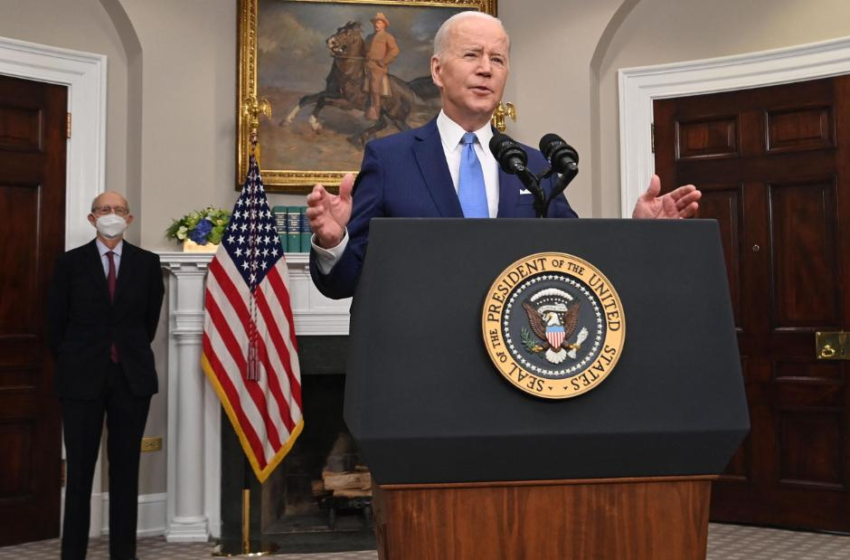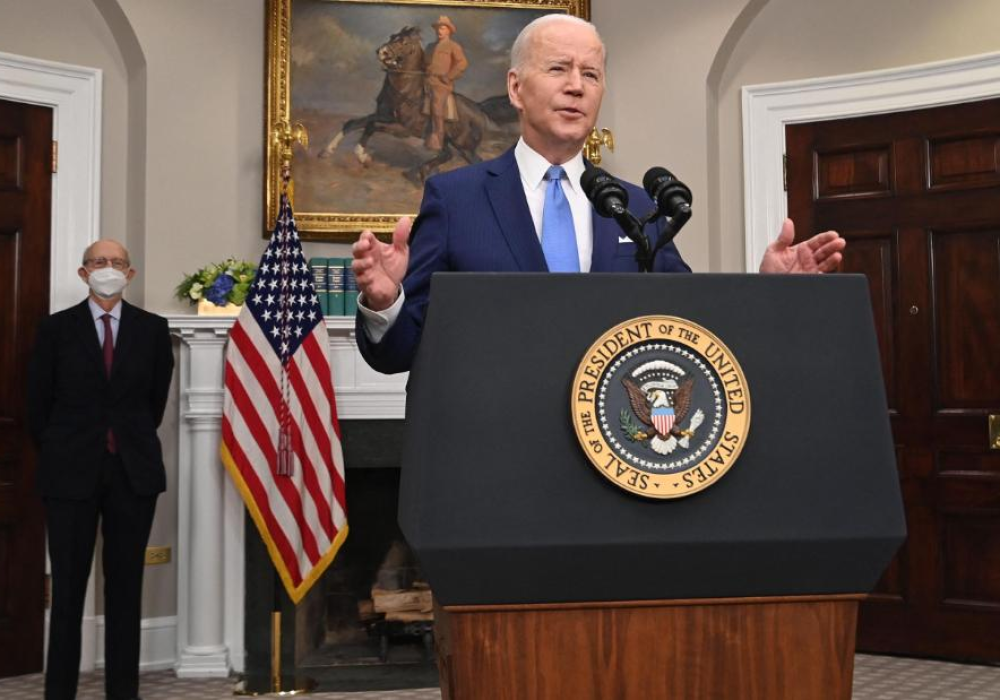“The person I will nominate will be someone with extraordinary qualifications, character, experience and integrity. And that person will be the first Black woman ever nominated to the United States Supreme Court,” Biden said. “It’s long overdue in my view. I made that commitment during the campaign for president, and I will keep that commitment.”
Biden said he expects to choose a nominee before the end of February and that he has not yet made a decision. The President said the selection process would be “rigorous,” and that he would “select a nominee worthy of Justice Breyer’s legacy of excellence and decency.”
In remarks from the White House, Biden — with Breyer by his side — said the justice’s retirement marked a “bittersweet day for me.”
“Justice Breyer and I go back a long way,” the President said, noting his friendship with Breyer stretches back 40 years.
The President said: “I’m here today to express the nation’s gratitude to Justice Stephen Breyer for his remarkable career in public service and his clear-eyed commitment to making our nation’s laws work for its people.”
“He has patiently sought common ground and built consensus, seeking to bring the court together. I think he’s a model public servant at a time of great division in this country,” Biden said. “Justice Breyer’s been everything his country could have asked of him.”
Biden was the Senate Judiciary Committee Chairman who presided over Breyer’s confirmation hearings when he was nominated to the Supreme Court in 1994.
The President said: “We were joking with one another when he walked in — did we ever think he’d have served decades on the court and I’d be President of the United States the day he came in to retire?”
In a brief speech that recounted historical figures from the nation’s past, including Abraham Lincoln and George Washington, Breyer thanked the President, reflected on his time on the high court and expressed optimism about the future of the country.
“This is a complicated country. There are more than 330 million people, and my mother used to say it’s every race, it’s every religion — and she would emphasize this — and it’s every point of view possible,” Breyer said.
He continued: “And it’s a kind of miracle when you sit there and see all those people in front of you. People that are so different in what they think. And yet they’ve decided to help solve their major differences under law.”
A key moment for Biden
“I enormously appreciate the privilege of serving as part of the federal judicial system — nearly 14 years as a Court of Appeals Judge and nearly 28 years as a Member of the Supreme Court,” he said, and added that the work has been “challenging and meaningful.”
Breyer said that his relations “with each of my colleagues have been warm and friendly” and that he has been aware “throughout” of the “great honor of participating as a judge in the effort to maintain our Constitution and the rule of law.” The letter was dated January 27.
Breyer’s retirement gives Biden the opportunity to nominate his first Supreme Court justice and reinforce the high court’s liberal minority. The nomination will be one of the most consequential choices of Biden’s presidency, and may offer him a political lifeline ahead of the 2022 midterm elections.
Biden’s pick to replace Breyer is expected be a younger liberal judge who could serve on the court for decades. The confirmation would not alter the Supreme Court’s ideological balance — the court has six conservative justices appointed by Republican presidents and three liberals appointed by Democrats.
But the confirmation of a liberal justice would be a major win for Democrats and could give the party a much-needed boost ahead of the November midterms. Biden’s approval ratings have slipped significantly in recent months and Democrats are bracing for the possibility that Republicans will take control of Congress.
Biden said Vice President Kamala Harris would be advising him in the selection process, noting she is the former attorney general of California and a former member of the Senate Judiciary Committee.
What comes next
Biden said on the 2020 campaign trail he intended to make history by nominating the first Black woman to serve on the Supreme Court. White House press secretary Jen Psaki told reporters Wednesday that Biden “certainly stands by” the promise.
Well before Breyer’s retirement plans became public, a short list of potential nominees had been circulating Washington and officials in the White House Counsel’s Office have built files on various candidates in anticipation of a potential vacancy.
Names on the list include: DC Circuit Judge Ketanji Brown Jackson, California Supreme Court Justice Leondra Kruger, South Carolina US District Judge J. Michelle Childs, North Carolina Supreme Court Associate Justice Anita Earls, Minnesota US District Judge Wilhelmina “Mimi” Wright, Circuit Judge Eunice Lee, Circuit Judge Candace Jackson-Akiwumi and Sherrilyn Ifill, a civil rights attorney who recently announced plans to step down from her role as president and director-counsel of the NAACP Legal Defense and Educational Fund.
Biden first made the commitment to nominate a Black woman to the Supreme Court in South Carolina — a key battleground state where Black voters make up a sizable portion of the electorate. The pledge helped Biden secure key endorsements, including from House Majority Whip James Clyburn, a South Carolina Democrat. Clyburn’s endorsement is largely credited with giving Biden’s struggling campaign the boost it needed to win the South Carolina primary, which put him on the path to win the Democratic nomination.
Clyburn told CNN’s Anderson Cooper on Wednesday night that he is pushing for Biden to nominate South Carolina US District Judge J. Michelle Childs.
Civil rights leaders pleased Biden keeps to commitment
Civil rights leaders outside of the government told CNN that Biden had often reiterated his pledge to nominate a Black woman in private conversations.
The Rev. Al Sharpton said he recalls that in at least one private setting since Biden took office, the President made clear to Sharpton his commitment to his pledge of appointing a Black woman to the bench.
“He brought it up that … he’s going to keep his word if the opening comes up,” Sharpton said.
Sharpton, who said he has already reached out to the White House since the news of Breyer’s retirement broke on Wednesday, emphasized that the impending historic nomination does not make up for the stalled voting rights legislation sitting in the Senate. He said he planned to push the White House to keep pushing on those bills.
“We’re glad to have a Black woman on the bench that’s qualified but that doesn’t mitigate voting rights,” he said. “Voting rights and police reform must be dealt with. They’ve not checked the box.”
Biden’s campaign promise to nominate a Black woman to the high court was a “bold commitment,” said Marc Morial, the president of the National Urban League, adding that he has not questioned whether the President would ultimately keep it. Morial said he feels the White House must move with speed through the confirmation process.
Both Sharpton and Morial told CNN that for now, they did not plan to publicly make an endorsement of any candidate, saying that the President should be given space to come to what will ultimately be his final decision.
“It is fair he should be given room to make the selection as long as she is qualified,” Sharpton said. “As long as he keeps his word, we should not get into an internal fight on which one of the picks, when we’ve never had a black woman. We should not undo what could be a great moment.”
Morial echoed that it would be “counter-productive to get into the game of speculation because many of the names that had been recommended are acceptable.”
“I’m not recommending anyone at this time because I think that the President should be given the prerogative to make a decision,” he added.
This story has been updated with additional information.










